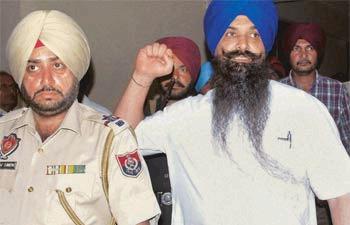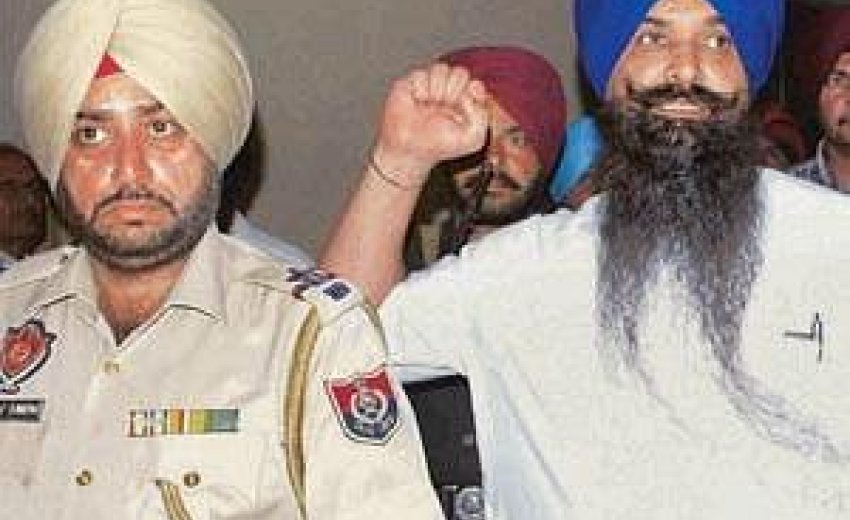 Beant Singh's assassin, Balwant Singh Rajoana, is to be hanged on Saturday, rules the court. But the jail authorities are reluctant to do.
Beant Singh's assassin, Balwant Singh Rajoana, is to be hanged on Saturday, rules the court. But the jail authorities are reluctant to do.
The political back and forth between the jail authorities and the courts continues. The courts have ordered a hanging; the jail authorities would like to defer the moment.
Why?
There is no doubt that Balwant Singh, by his own admission, is guilty in the killing of Beant Singh, the former Chief Minister of Punjab, almost a decade ago in 1995.
Balwant Singh has not requested a delay. He has not appealed to a higher court. He has not petitioned for mercy.
Balwant Singh absolutely refuses to recognize the courts or the legal proceedings that convicted him and sentenced him to die.
He has repeatedly and clearly asked that no one intercede on his behalf.
It is not that Balwant Singh wants to die; it is that he is willing to do so.
It is that everyone is free to challenge the existing law, whether on taking a life, as Balwant Singh did, or going through a red light. Each carries a price that the law demands.
When a man deliberately decides to break a law he must also be ready to pay the piper. And Balwant Singh is.
He committed a crime. Why?
Because Beant Singh, the Chief Minister, was responsible for the arbitrary and capricious murder of so many innocent Sikhs -- all in the name of state security and peace. Something had to be done. The state mechanisms of justice had totally failed. And when all other means have failed it is just and rightful to take to the sword.
This is what Balwant Singh did. That is why to the peasantry of Punjab Balwant Singh has reached an iconic status.
But when the courts have so ruled why do the jail-authorities cringe at carrying out the orders?
Simply because the jailers and those designated to carry out the hanging see the political realities. To most Sikhs Balwant Singh is a man who has done no wrong; he is a hero to so many that it would be politically unwise to hang him. Many would like to give him a medal instead.
From a hanging a popular backlash could result and that would hardly be conducive to peace.
His guilt is not at issue today. It is the shortsighted political decision that is to be rued.
A crime deserves punishment and alternatives to hanging exist.
Before Indians in India – Sikhs and non-Sikhs – take umbrage at my words; to them what I say sounds like interference in the internal affairs of their country, I ask them to think a little. Not so long ago, when apartheid was the law of the land in South Africa, it was our moral duty to raise our voices against it – no matter if we were citizens of India, Germany, Africa or India. Why then should we hold our tongue in the case of miscarriage of justice in India?
South Africa is not the only nation whose genocidal policies raised our hackles. It became everyone’s cause, no matter the race, color, caste, creed, religion or geography and nationality.
Take careful note of the fact that India’s record of justice for its own people is horrendous. One example of many that exist: the killing of several thousand Sikhs in its capital city of Delhi in 1984 when the police watched, if not aided and abetted the murders. And where is justice now 28 years and a dozen Inquiry Commissions later? Still waiting!
I would be willing to bet that the ordinary Punjabi, the ordinary Sikh, grieves for Balwant Singh today while at the same time he salutes and celebrates the courage of his convictions.
Hanging of the man – Balwant Singh – who acted in the face of such unabated injustice would reopen fresh the wounds of the 1980’s. And that is not the way to a future of peace. It is the way to unending resentment and violence.
Is that what the policymakers in India want? I would think they are a lot smarter than that.
A government of the people ought to listen to the people; it needs to have an ear to the ground
March 28, 2012
